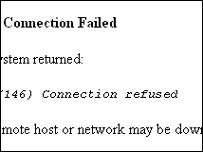|
By Mark Ward
BBC News Online technology correspondent
|


Too much traffic can stop you seeing a website
|
Many people dream of having an idea which is so good that people around the world will admire it. But popularity can have its price, particularly on the internet.
Having a good idea almost cost freelance journalist Glenn Fleishman $15,000 (�9,300).
Like millions of other people Mr Fleishman owns a few net domains that usually enjoy a steady, rather than spectacular, stream of visitors.
Site savers
All that changed when he made freely available for download a copy of a 900 page book he co-wrote about Real World Adobe GoLive 6, somewhat ironically a software package that people can use to make websites.
He was expecting interest from a few hundred people but instead within 36 hours, thanks to a link on the MacCentral site, it was downloaded more than 10,000 times.
 You just get these perfect storms that you cannot predict
You just get these perfect storms that you cannot predict

|
By the time Mr Fleishman noticed, the total downloaded had reached 250 gigabytes.
Most hosting and co-location companies charge domain owners by the amount of bandwidth, which broadly equates to visitors, they consume per month.
According to figures from hosting company 1+1 Internet an allowance of 40 gigabytes per month probably equates to between 400,000 and 1m visitors a month, depending on the size and complexity of the site.
Some hosting firms, which provide the servers on which sites sit, simply cut customers off if they exceed their monthly allocation. Others impose per-megabyte or per-gigabyte charges.
The per-gigabyte charges levied by Mr Fleishman's hosting firm meant he was facing a potentially huge - and unexpected - bill.
He's not alone.
Audience figures
The steadily rising web using population, now more than 600 million, and the dynamics of web use mean that a site only has to be passed around a few times or featured on a few popular sites to generate huge traffic.
"There's so many hundreds of millions of people with the internet that every ten minutes someone must be getting slammed," said Mr Fleishman.

The census website was knocked offline by excess interest
|
One example is Ze Frank who sent his website's address to 17 friends so they could check out his crazy dance moves.
Those friends passed it on and soon his site was getting more than a million hits a day.
The site set up to celebrate the eccentricities of former Iraqi information minister Mohammed Saeed al-Sahhaf also proved hugely popular. It was briefly offline while it was moved to a machine that could cope with more hits per second.
Also well known is the "Slashdot effect" that afflicts sites mentioned on the popular Slashdot website. Often so many people follow up a mention by clicking the associated link that a page is impossible to reach.
The problem, said Mr Fleishman, is that it is impossible to work out beforehand how popular your site is going to be.
Businesses running a website will probably prepare for the expected crowds and sort out duplicate hosts and mirror sites long beforehand. But few personal sites will take precautions.
"You just get these perfect storms that you cannot predict," he said.
The advice of Ken Sorrie, boss of domain and hosting firm Internetters, is to shop around.

The site celebrating the Iraqi Information Minister was a big hit
|
He said anyone considering signing up with a hosting firm should find out its excess charges, what happens if it does exceed a limit, and how many hits per second it will be able to handle.
The excess charges vary widely. Some charge per megabyte, some per gigabyte and a few impose no limits at all. Some charge a few pence per gigabyte and some pounds.
Mr Sorrie said most sites give customers tools that log traffic figures and reveal sudden surges.
"It has to be colossal traffic and happen quickly for everyone to be caught out," he said.
Surges in traffic, caused by a website getting a mention on Slashdot, usually tailed off quickly and rarely meant someone faced excess charges, said Mr Sorrie.
As for Mr Fleishman, luckily he pulled the file off the web before his hosting company's charges kicked in.
